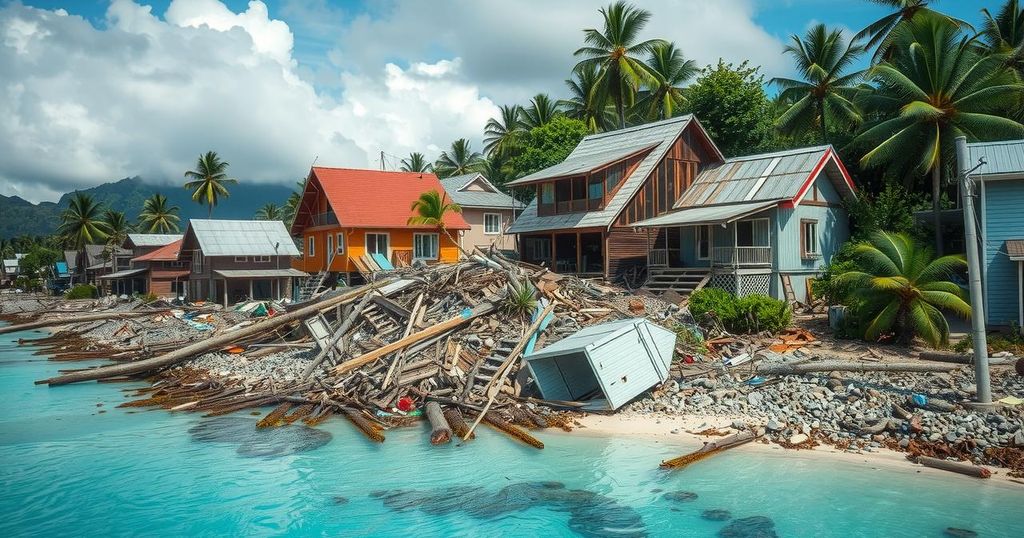Natural Disasters: The Impact of Cyclone Chido and Vanuatu Earthquake on Human Health and Recovery Responses

Cyclone Chido has caused significant devastation across Mayotte, Comoros, and Mozambique, while a powerful earthquake struck Vanuatu. Direct Relief is working to assess and address the health needs of these affected communities, delivering medical support and essential supplies to mitigate the long-term health risks associated with such natural disasters.
Tropical Cyclone Chido recently wreaked havoc across the Mayotte archipelago, Comoros, and Mozambique, leading to severe destruction and a tragic loss of life. As this natural disaster unfolded, a 7.3-magnitude earthquake hit Vanuatu, further compounding the already dire circumstances for these vulnerable communities. Cyclone Chido has been identified as the most potent storm to strike Mayotte in over nine decades, unleashing winds surpassing 140 miles per hour and colossal storm surges that devastated entire neighborhoods, particularly affecting informal settlements.
In the immediate aftermath, the official death count in Mayotte currently stands at 22; however, it is feared that the actual number of casualties is significantly higher. In Comoros, similar devastation was reported, prompting President Azali Assoumani to declare a week of mourning due to the extensive damage to the country’s infrastructure. Mozambique also faced dire consequences as the cyclone made landfall, with winds exceeding 160 miles per hour further exacerbating the existing vulnerability of the region.
Direct Relief is actively assessing the situation to determine urgent needs in affected areas. In collaboration with French emergency management agencies, the organization aims to address healthcare requirements in Mayotte. In Comoros, it is coordinating with its long-term partner Santé Diabète to facilitate essential support, while discussions with Mozambique’s Ministry of Health are ongoing to deliver emergency medical supplies and logistical assistance.
The earthquake in Vanuatu has led to widespread destruction to homes and healthcare resources, with aftershocks continuing to pose risks. Direct Relief is working to evaluate the urgent needs in the region, with shipments of medical supplies en route to provide immediate assistance.
Disasters such as cyclones and earthquakes pose significant threats to human health, causing mass casualties and overwhelming local healthcare infrastructures. They also precipitate immediate and long-term health risks, including disease outbreaks from contaminated water sources, displacement leading to overcrowded and unsanitary conditions, and interruptions in care for chronic health conditions. Vulnerable populations, including pregnant women and infants, are particularly at risk due to disrupted access to essential health services. Direct Relief is committed to delivering necessary medical supplies such as trauma kits and vaccines to frontline healthcare providers.
With a strong history of disaster response, Direct Relief has previously provided substantial medical aid to support recovery efforts in regions impacted by natural disasters. This includes post-Cyclone Idai support across Mozambique, Zimbabwe, and Malawi, emergency assistance after devastating earthquakes in Türkiye and Syria, and comprehensive aid following the catastrophic impacts of Hurricane Dorian in the Bahamas. Direct Relief’s proactive approach, including pre-positioning medical supplies in high-risk areas before cyclone and hurricane seasons, illustrates its commitment to facilitate timely medical assistance during disasters.
As the impacts of Cyclone Chido and the earthquake in Vanuatu continue to unfold, Direct Relief remains devoted to ensuring that healthcare providers on the ground receive the support they need, facilitating recovery efforts, and guaranteeing access to life-saving medical care for affected populations.
The recent occurrences of Cyclone Chido and a significant earthquake in Vanuatu exemplify the vulnerabilities faced by communities in disaster-prone regions. Cyclone Chido has been noted as an unprecedented weather event in recent history, particularly affecting Mayotte, Comoros, and Mozambique. Concurrently, natural disasters like earthquakes pose formidable challenges, often overwhelming local health systems, leading to increased mortality and health risks in affected regions. Organizations such as Direct Relief play a crucial role in delivering much-needed medical aid and logistical support during such catastrophic events, addressing both immediate healthcare needs and long-term health challenges.
In summary, the devastation caused by Cyclone Chido and the earthquake in Vanuatu highlights the critical vulnerabilities faced by affected communities. These disasters not only lead to immediate loss of life and infrastructure damage but also pose long-term health risks. Direct Relief’s ongoing commitment to disaster response and recovery is vital in ensuring that essential medical care reaches those most in need, thereby aiding communities in their recovery efforts.
Original Source: www.directrelief.org








